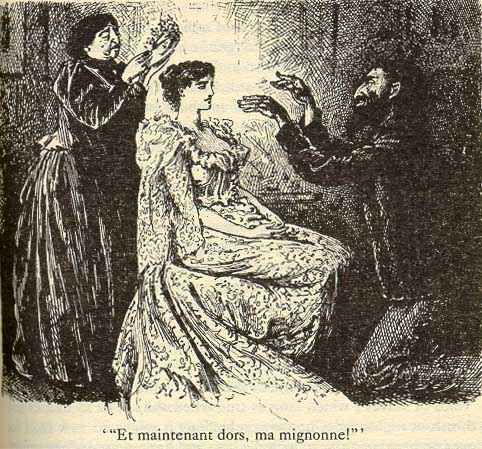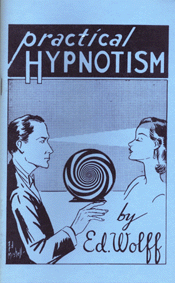|
Hypnotism You are feeling very sleepy... Your eyes are getting heavy... heavy... heavy... No, you're not sitting through a Merchant-Ivory historical costume drama starring Helena Bonham Carter, you're being hypnotized!
You are feeling very sleepy... Your eyes are getting heavy... heavy... heavy... No, you're not sitting through a Merchant-Ivory historical costume drama starring Helena Bonham Carter, you're being hypnotized! Hypnotism is one of the weirdest and most controversial notions in the history of the mind. Even defining it is tricky. Basically, hypnotism is the art of placing another person into a trance state. What happens next depends largely on whether you're at a Las Vegas show, in a therapist's office or a prisoner of a Orwellian police state. Hypnotism was more or less discovered by a guy named Franz Anton Mesmer, who invented something he called animal magnetism. Mesmer had a natural talent for putting people and animals into trances, which he mistakenly attributed to magnetic waves. His technique became known, predictably, as mesmerism. Mesmer and his successors soon discovered that the whole magnet idea was a crock of shit. The technique worked by offering people a specific visual focus and the monotonous repetition of soothing words. In a hypnotic state, normal consciousness undergoes a strange metamorphosis. The thinking, aware part of the mind recedes and a kind of automatic response system takes over. The most notable aspect of this trance is suggestibility. The hypnotist can, to a certain extent, alter the subject's consciousness and manipulate his or her actions.
In a hypnotic state, however, the subject's conscious mind is coaxed into playing along with an elaborate charade, with surprisingly effective results. It's more than make-believe but less than virtual reality. The hypnotist makes suggestions to the subject, and the subject's brain plays along by believing the suggestions with a greater-than-normal intensity. So when the hypnotist in a Vegas lounge tells the subject that he or she is a chicken, for example, the subject obliges by walking around clucking without a trace of self-consciousness. If our Vegas showman told his hapless performer to shoot himself, however, some deep-rooted self-protective impulse kicks in and vetos the idea. There are ways around this, but for obvious reasons there aren't a lot of scientific studies outlining the details. For instance, the hypnotist could theoretically tell the subject that the real gun in his hand was a water gun, and perfectly harmless. When the subject is subsequently told to cool his sweaty brow, well, much gruesome hilarity ensues.
Unfortunately, all this sounds better on paper than it actually works in real life. Hypnotism is highly controversial for any number of reasons. Some psychiatrists don't even believe it exists, attributing the visible effects to some kind of placebo-effect gullibility inherent in human nature. Among those who believe hypnotism does exist, there's still a dramatic range of opinions about how effective it is for any number of tasks. For instance, despite thousands of hypnotists around the country offer "stop smoking" programs. It sounds great! You hypnotize the smoker, tell him they hate smoking, or they get sick when they pick up a cigarette, and presto! No more smoking! Except it doesn't work. While hypnotists claim success rates between 90% and 99%, the U.S. surgeon general says there is "insufficient evidence to support hypnosis as a treatment for smoking cessation." By which, specifically, they mean there are no reasonably credible studies to support the idea. It probably can't hurt, and it very likely helps some people, but 99% is clearly bullshit. Same goes for weight-loss programs, success in business and all manner of personal growth goals which would-be subjects of hypnotism lack the willpower to accomplish for themselves. Another area in which hypnotism is much-hyped but little proven is the art of creating the perfect assassin. About five minutes after Mesmer produced his first trance, people started speculating about hypnotism's potential use in Mind Control. Aside from providing fodder for great movies like "The Manchurian Candidate" and "Telefon," in which hypnotized subjects are programmed to transform into remorseless killing machines, there's no credible account of a hypnotized assassin ever succeeding in his appointed task.
A widely circulated theory, not too far outside the mainstream, suggests that Sirhan Sirhan might have been the victim of mind control. Various tests performed after his arrest suggested that Sirhan was an extremely susceptible hypnotic subject. During the shooting, witnesses reported that Sirhan seemed to move robotically. After his arrest, he wrote "RFK must die" over and over again in a notebook, apparently in a trance state. When a psychiatrist attempted to hypnotize him, the first words out of his mouth were "I don't know any people." All this is pretty impressive, but none of it stood up in court. Well, not yet. Sirhan's original attorneys neglected to bring the whole hypnotized mind control thing up. An appeal filed in 2002 attempted to resurrect the hypnosis premise, but the appeal was thrown out by the Supreme Court without comment in early 2003. Looks like you'll have to wait for the history books on that one... |
 It's generally believed that hypnotized subjects can't be forced to do things they wouldn't normally do, which seems to be a pretty accurate assessment, since a cabal of hypnotists is not (visibly) running the world... Not... Running... The... World... Noooooo... Uh, sorry, I spaced out a minute there. Anyway, the point is that hypnotism is A Very Good Thing That Cannot Possibly Be Used For Evil.
It's generally believed that hypnotized subjects can't be forced to do things they wouldn't normally do, which seems to be a pretty accurate assessment, since a cabal of hypnotists is not (visibly) running the world... Not... Running... The... World... Noooooo... Uh, sorry, I spaced out a minute there. Anyway, the point is that hypnotism is A Very Good Thing That Cannot Possibly Be Used For Evil. In addition to tinkering with a subject's perceptions and behavior during the hypnotic state, a hypnotist can also plant something called a "post-hypnotic suggestion." This is a planted instruction that kicks in later, either as part of the subject's later behavior or in response to a specific triggering action.
In addition to tinkering with a subject's perceptions and behavior during the hypnotic state, a hypnotist can also plant something called a "post-hypnotic suggestion." This is a planted instruction that kicks in later, either as part of the subject's later behavior or in response to a specific triggering action.  Well, except maybe one. You may have heard of a guy named
Well, except maybe one. You may have heard of a guy named